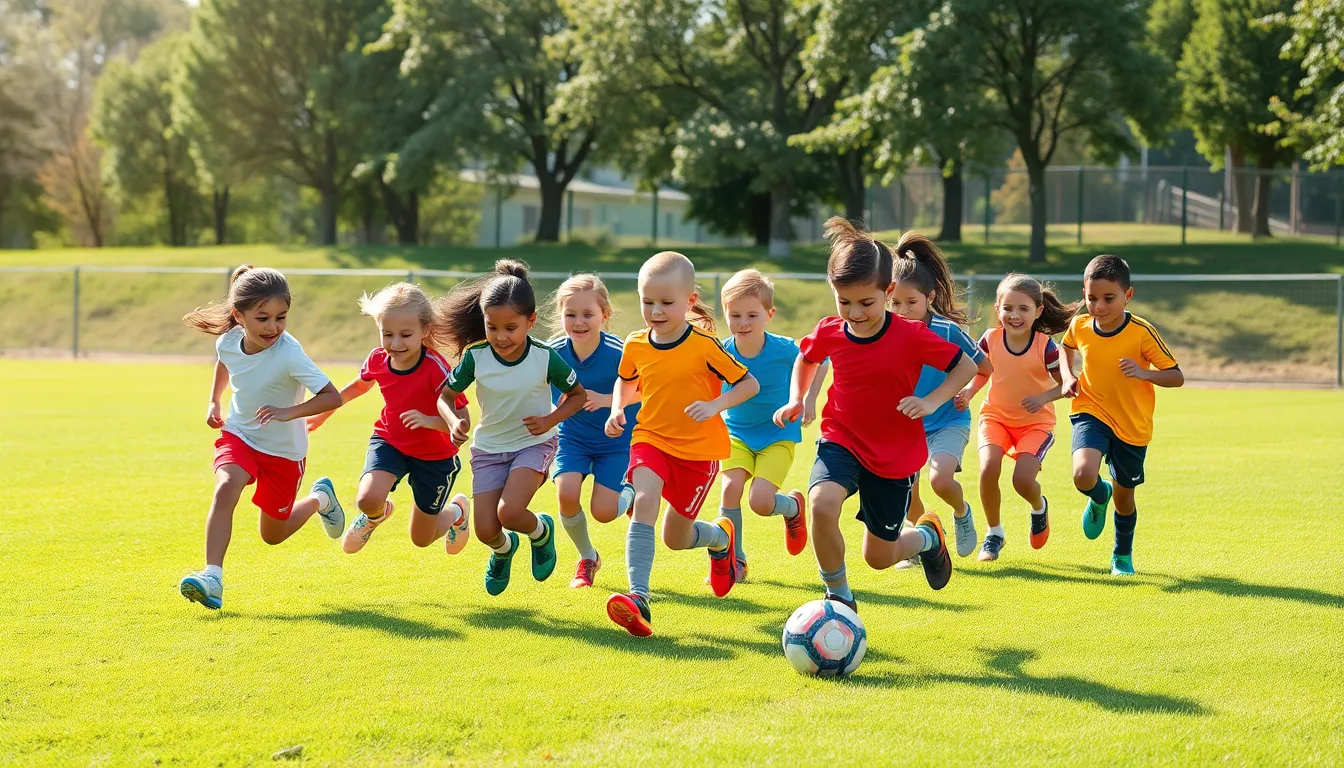Table of Contents
ToggleAfter school sports aren’t just about scoring goals or hitting home runs; they’re the secret sauce to a kid’s development. Imagine a world where children trade in their screens for sweatbands and teamwork. It’s a win-win: they get to burn off that extra energy while learning valuable life skills. Who knew running laps could also boost social skills and self-esteem?
Plus, after school sports are a fantastic way to keep kids engaged and off the couch. Forget about the dreaded “I’m bored” phase; with a range of activities from soccer to swimming, there’s something for every budding athlete. So, let’s dive into why after school sports are more than just a pastime—they’re an essential part of growing up, and they might just turn your child into the next sports superstar (or at least a better team player at the dinner table).
Overview of After School Sports
After school sports programs offer diverse opportunities for children to engage in physical activity outside regular classroom hours. Participation in these activities significantly boosts physical fitness levels, promoting overall health and wellness. Team sports such as soccer, basketball, and volleyball foster teamwork and collaboration, essential skills that benefit children in various aspects of life.
Skills developed in after school sports extend beyond athleticism. Social skills thrive through interaction with peers, as kids learn to communicate and resolve conflicts on and off the field. Confidence builds when children achieve personal goals, whether it’s scoring a point or mastering a new skill. The camaraderie formed in sports often leads to lasting friendships, enriching their social circles.
Flexibility in program offerings ensures children can choose activities that suit their interests and abilities. Options like swimming, tennis, or martial arts cater to different preferences, allowing for personal exploration and growth. Regular participation in after school sports can also serve as a productive outlet for stress, promoting mental health alongside physical well-being.
Research indicates that engagement in sports correlates with higher academic performance. Involvement in structured activities encourages discipline and time management, beneficial traits for academic success. Statistical evidence reveals that children involved in after school sports often demonstrate improved focus and responsibility in their studies.
Access to after school sports contributes to a community’s vitality. Many local schools and organizations offer programs, ensuring children from diverse backgrounds can participate. Community support plays a crucial role in sustaining these initiatives, allowing for growth in both participation and skill development.
Benefits of After School Sports

Engaging in after school sports offers numerous advantages that contribute to children’s well-being and development. These activities promote physical health and enhance mental resilience.
Physical Health Benefits
After school sports significantly improve children’s physical health. Regular participation boosts cardiovascular fitness and enhances muscle strength. Children engaged in activities like soccer or basketball develop coordination and flexibility. According to the Centers for Disease Control and Prevention (CDC), physically active youth have a lower risk of obesity. These programs also encourage healthy habits, reducing screen time and increasing outdoor play. Participation in sports cultivates lifelong fitness behaviors, leading to overall better health outcomes.
Mental Health Benefits
Mental health benefits arise from engaging in after school sports as well. Children gain confidence through skill development and teamwork experiences. They learn to navigate challenges, fostering resilience in stressful situations. Social interactions through sports enhance communication skills and build lasting friendships. A study by the American Psychological Association illustrates that active youth exhibit lower levels of anxiety and depression. Regular physical activity acts as a constructive outlet for stress, promoting emotional well-being and improving mood.
Types of After School Sports Programs
After school sports programs offer a variety of options that cater to different interests and abilities. Engaging in these activities helps children further develop their skills.
Team Sports
Team sports include soccer, basketball, and volleyball. These activities emphasize collaboration and communication, essential skills for life. Participants work together toward common goals, building not only athletic skills but also friendships. Involvement in team sports enhances self-esteem and fosters a sense of belonging among peers. As kids practice together, they learn to overcome challenges, which cultivates resilience. Such engagement also encourages regular attendance, leading to improved discipline. Research supports that kids involved in team sports often experience better emotional health and social interactions.
Individual Sports
Individual sports, such as swimming, gymnastics, and martial arts, provide unique benefits. These programs allow for personal exploration and self-discipline, making them ideal for children who prefer solitary activities. Kids set individual goals, enhancing motivation and accountability. Each session encourages focus and improves skill mastery over time. Engaging in individual sports helps enhance confidence and self-reliance, as children take personal ownership of their progress. Furthermore, research indicates that participation in these programs correlates with improved mental health outcomes. Active individuals often experience reduced stress levels and better coping strategies in daily life.
Impact on Academic Performance
Participation in after school sports significantly enhances academic performance. Students engaged in sports demonstrate improved focus and discipline, essential traits for successful learning. According to research conducted by the American Psychological Association, active youth achieve higher grades and exhibit better attendance rates.
Structured activities teach time management, as athletes balance their sports commitments with academic responsibilities. Regular involvement in team sports fosters collaboration and communication skills, which translate well into classroom interactions. They develop critical thinking through solving strategic game challenges, enriching their academic learning experience.
Moreover, the discipline gained from regular practice and competition promotes a healthy work ethic. Students who participate in sports often exhibit greater motivation and perseverance in their studies. Increased self-esteem and confidence, fostered by sports achievements, empower children to tackle academic challenges more effectively.
Schools implementing after school sports programs report positive impacts on overall student engagement. Data indicates that engaged students are likelier to participate in class discussions and complete assignments. Encouraging a consistent after school routine can provide students with essential life skills, which significantly contribute to academic success.
Furthermore, physical activity helps relieve stress, creating a conducive learning environment. Active children experience lower levels of anxiety and improved emotional well-being, leading to better concentration in class. The holistic benefits of after school sports underline their importance in enhancing not just physical fitness but also academic achievement.
Community and Social Engagement
Participation in after school sports significantly enhances community connections. Local organizations often sponsor programs that unite children across diverse backgrounds. Everyone benefits from these shared experiences, forming strong bonds through teamwork and mutual goals.
Building friendships during practice and games fosters a supportive environment. Children learn to cooperate, communicate, and resolve conflicts, essential skills for future success. These social interactions contribute to a sense of belonging, making kids feel valued within their communities.
Additionally, after school sports connect families by encouraging parental involvement. Events and competitions provide opportunities for parents to engage with their children and support their teams. This involvement strengthens family ties while promoting a unified community spirit.
Local schools play a crucial role in offering after school sports programs. Many schools partner with community organizations to ensure access for all students, promoting inclusion and participation across economic barriers. By prioritizing accessibility, these programs have a lasting impact on community wellness.
Research underscores the correlation between sports engagement and community development. Engaged children often show improved social responsibility and leadership skills. These attributes help create active and informed citizens who contribute positively to their communities.
Lastly, the volunteerism that arises around after school sports enriches community life. Coaches, parents, and older athletes often contribute time and expertise, building connections among various age groups. Such collaboration enhances social networks, fostering a culture of support and encouragement.
After school sports play a vital role in shaping children’s lives. They offer more than just physical activity; they foster essential life skills and promote overall well-being. By participating in these programs, kids not only improve their fitness but also build confidence and develop strong social connections.
The impact of after school sports extends beyond the individual. These activities create a sense of community and encourage parental involvement, strengthening family bonds. With diverse options available, every child can find an activity that resonates with their interests, ensuring a positive and engaging experience.
Ultimately, after school sports serve as a powerful tool for personal growth, academic success, and community engagement, laying a solid foundation for a healthier and more connected future.










